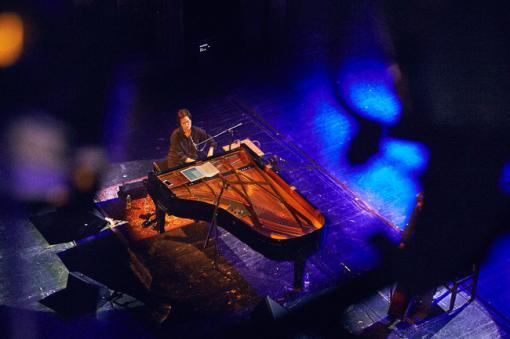In including Patricia Barber in the concert series of the National Theatre Brno the director Filip Haberman has fulfilled not just his own dreams. The original jewel of the American jazz scene filled the Mahen Theatre with listeners and provided a spectacular musical experience. It was as if the space was predestined for the performance of this concert. The theatre auditorium underlined the singer’s grandeur, but at the same time created a chamber, almost club-like atmosphere. This time Patricia Barber travelled to the Czech Republic from her hometown of Chicago as a trio of young musicians – with the double bass player Patrick Mulcahy and the drummer Nat Friedman.
Patricia Barber is a spontaneous and very natural interpreter. She performs barefoot, does not make concert set lists, and so this time as well the songs and compositions from their joint repertoire were chosen according to the mood of the moment. She alternated between her own works, standards and even classical chamber music in jazz clothing.
The introductory instrumental composition progressively presented as soloists all the members of the trio and tuned all present into the same wavelength. Patricia’s virtuoso playing on the piano does not deny her classical education, but neither do her experiments with the sound of the piano and her excursions into the higher musical realms, supplemented by involuntary cries, deny the thinking and heart of jazz. This is evident also in her versions of well know songs and standards, such as for example I Could Have Danced All Night. In their performance, this fifty-year-old text took on a whole new meaning. The lyrics are also of great importance in her own works and in concert she ensures that they excel in their recital, phrasing and perfect pronunciation. She also demonstrated this in the songs The Wind Song and Higher from the chamber cycle Angels, Birds and I, which also appeared in the world of classical music from Renée Fleming. Also drawing on classical music was the jazz version of the composition L’heure exquise, written in the first half of the 20th century by Reynaldo Hahn (for me one of the heights of the evening). Her musical roots supplied a composition from the repertoire of the Duke Ellington Orchestra, which also included Patricia’s father. The whole evening characteristically ended with the composition You Gotta Go Home, which the composer placed in the category of annoying songs which according to her audiences like.
The visible age difference between the jazz diva and her fellow players was not evident at all in the music. Each of them perfectly supplemented the other but also made interesting use of the solo space. The audience then rewarded the intensive ninety-minute performance by all of the musicians with a standing ovation. In turn they played two encores and promised to return to Brno.
In conclusion it is necessary to also appreciate the work of the sound and lighting engineers, who carefully followed the mood and atmosphere of individual compositions. The vocal tracks were complemented by subtle lighting accents, the ceiling paintings of the theatre and its crystal chandelier, which created charming effects. In the more intimate instrumental compositions in contrast the lighting was set to a minimum and gently accented only the playing musicians. The final illumination of the hall was the entrancement provided by Patricia herself.































